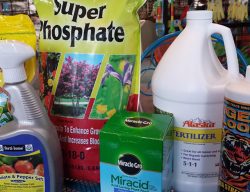 As vegetables grow in your garden, they remove important nutrients from the soil that are necessary for development. Adding fertilizer will help replace elements like nitrogen and phosphorus to aid in growth and yield. There are many methods of fertilizing and many types of fertilizers out there so you have a number of options to achieve the desired results.
As vegetables grow in your garden, they remove important nutrients from the soil that are necessary for development. Adding fertilizer will help replace elements like nitrogen and phosphorus to aid in growth and yield. There are many methods of fertilizing and many types of fertilizers out there so you have a number of options to achieve the desired results.
The two basic categories of fertilizer are organic and conventional (synthetic) fertilizer. Both methods will work but there are some pros and cons to consider for each. The major reason to choose an organic vegetable fertilizer is to build up your soil for the long haul. Organic fertilizers do not result in salt buildup in the soil and run a significantly lower risk of causing fertilizer burn on plants. The main disadvantage is that organic fertilizers often come with a higher price tag, and because they tend to dissipate more quickly once applied, may need to be applied more frequently. A conventional fertilizer, by contrast, may cause salts to build up in soil over time. However, many conventional fertilizers are less expensive than organics and are formulated to be slow-release, meaning one application can feed plants over a much longer time period than an organic fertilizer. As always, it is important to do some product research and read the instructions carefully before use. Consult one of our experts if you have doubts on how to use the product.
Please keep in mind that adding nutrients that are not needed can result in deficiencies of other nutrients and can damage your plants. For this reason, over fertilizing can be worse than not adding enough. The only real way to judge your soil’s needs is to have a soil analysis completed. Locally, the CSU soil lab will do an analysis for a small fee.
Originally published on July 1st, 2015. Updated on July 30th, 2024.
